Blowing bubbles: Salmon farming campaigner, Corin Smith, has announced that the revolution has begun because land-based salmon farming is now commercially viable. His pronouncement comes after Atlantic Sapphire completed their first commercial harvest of land-based farmed salmon in the US. Mr Smith says land-based farming is now a credible alternative to the ‘feedlot’ salmon industry in Scotland and this moment should signal the start of the inexorable demise of the open cage industry.
Sadly, Mr Smith is being somewhat premature but that’s because he really doesn’t understand the commercial realities of land-based farming. This is something of a puzzle given his expertise in business finance, which in his case was with the on-line betting company Betfair. Indeed, if Mr Smith is so convinced about the future of land-based farming perhaps he should take a gamble and put a bet on whether companies like Atlantic Sapphire are still in business in ten years’ time. At this moment, I certainly wouldn’t put any money on it.
I also wouldn’t be like to depend on the news about this first harvest. In their media release the company states that the company celebrated a ground-breaking moment with the first harvest of US Bluehouse Salmon at scale. What it doesn’t say is what they mean by scale. Salmon Business asked the company exactly how much fish was harvested but they failed to respond. The company was supposed to have harvested 1,000 tonnes by mid-2020 but they clearly missed that target. These targets are important to Atlantic Sapphire because they have their investors to consider. Such a huge amount has been invested in Atlantic Sapphire as well as other fledgling land-based companies, that they need to keep to their plans otherwise risk losing investors. From May this year, the company was listed on the Oslo stock exchange and Salmon Business reported at the time that they had a production target of 10,000 tonnes a year by Q3 2020. The company said that the attraction of this listing was to allow more investors to take part in this innovative salmon farming venture. Of course, it also allows investors to sell their shares if the promises do not live up to expectation.
It is already possible to see the amount of pressure the company is under to perform by the announcement in August that 200,000 fish had been slaughtered prematurely at the farm. Rather strangely, Mr Smith who is quick to comment on mortality events in net pen farms remained silent on these deaths. The fish had been stressed due to construction work elsewhere on the farm. This should not come as any surprise to those who understand the industry as salmon are extremely sensitive fish. The fact that tanks had been stocked whilst the farm was still under construction was another example of the pressure to get results rather than wait until work was completed. The impact on the fish was somewhat predictable. Atlantic Sapphire had also lost another 227,000 fish in their Danish farm earlier in the year. The success of land-based farming is no forgone conclusion.
Atlantic Sapphire would need to operate profitably for at least five years before I am convinced that such land-based farms are commercially viable. One harvest is meaningless.
Harvesting is just one side of the story. Intrafish have said that the biggest question on investors and rivals’ minds is how much, if any, premium will the fish fetch? However, why the fish should receive a premium is unclear? They are produced nearer the market so therefore should be possibly cheaper than imported fish.
According to Intrafish, Atlantic Sapphire have announced that retailers will be selling the fish at $14.99/lb (about £26/kg) which they say is putting their fish at a competitive price with other fresh farmed salmon on the US retail market. What is also unknown is how this price relates to the true cost production. The question is whether this recommended price is subsidised to make it more attractive to consumers.
Intrafish compared this price with other farmed salmon being sold in some US stores. All the salmon is described as farmed Atlantic unless otherwise stated. The cheapest they found was in Walmart at $7.84/kg (13.60/kg), Kroger and Albertsons at $7.99/lb, Wholefoods and Trader Joes at $9.99/lb, H.E.B at $10.27/lb, Giant Eagle Norwegian at $10.99/lb and Giant Eagle Faroese at $15.99/lb (£27.70/kg).
Atlantic Sapphire announced they would be selling their fish to a range of stores including Giant Eagle, H.E.B., New Seasons Markets, Publix, Safeway, Sobey’s, Sprouts Farmers Market, Wegmans and the Chef’s Warehouse.
The fact that Intrafish quote prices for both Norwegian and Faroese salmon highlights that the salmon market in the US is not straightforward. Shoppers have access to national, regional and local store chains ranging from premium to value. Larger chains can offer a number of different options of salmon so shoppers might have to select from a range of choices even in the same store. It is therefore not a matter of Atlantic Sapphire having to compete against Walmart’s cheaper salmon fillet.
To illustrate the point, the store chain Wegmans, one of those which is to take salmon from Atlantic Sapphire in Miami has the following salmon choices available to consumers.
The best deal is a pack of over 1kg of salmon selling for $7.99/lb, not that much different from the price at Walmart.
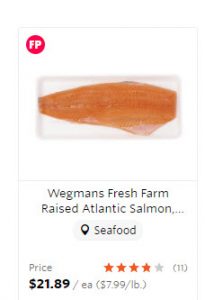
Wegmans standard salmon fillet is priced at $9.99/lb.
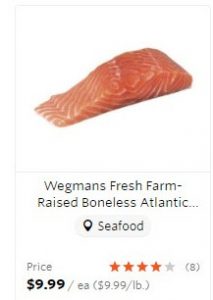
Wegmans also offer salmon belly or top loin priced at $12.99//lb equivalent to $2/lb cheaper than the Atlantic Sapphire fish.
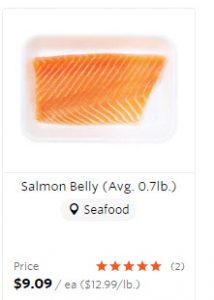

They also supply a fixed weight portion which works out at £13.99/lb or $1/lb less than the Atlantic Sapphire product.

Finally, their premium product is European supplied organic salmon fillet at $18.99/lb or $4/lb more than the Atlantic Sapphire recommended price.
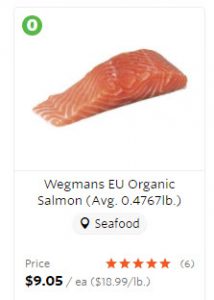
In addition, Wegmans are already selling Bluehouse salmon fillets selling at $14.99/kg but grown at their Danish facility and flown over to the US. Clearly, the price is subsidised in some way as there seems little justification for charging the same price if the fish does not have to be flown in from Europe.
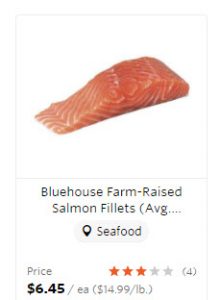
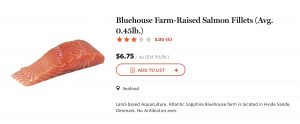
John Andreassen, founder of Atlantic Sapphire posted the following photo of their Bluehouse Salmon displayed in a Wegman’s store.
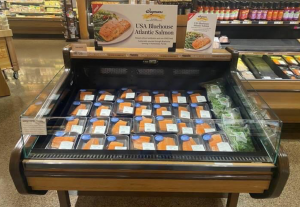
What is interesting is that one of the benefits being promoted for land-based farming in the US is proximity of the market. Wegman’s stores are located along the eastern states from Massachusetts to North Carolina but News Seasons Markets by comparison can be found in Oregon, across the other side of the US. Even more interestingly, Sobey’s are the second largest food retailer in Canada. This is not really local production near to the market.
Of course, Atlantic Sapphire Bluehouse salmon does not just have to compete with other farmed salmon, Wegmans like many other US stores sell wild caught fish from Alaska. They have a choice with these fish too.
The cheapest Pacific salmon is the Sockeye selling at $16.99/lb. The Keta salmon sells at $17.99/lb in a family pack of about 2lb of fish whilst the Coho is the same price. Finally, the King salmon sells at a whopping $27.99/lb which is equivalent to £48.50/kg.
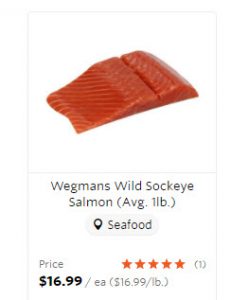
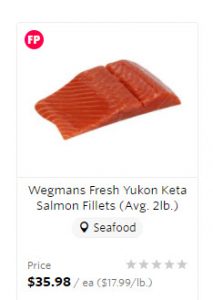
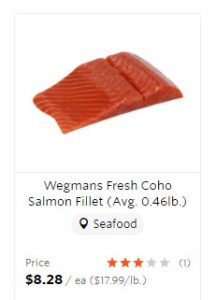
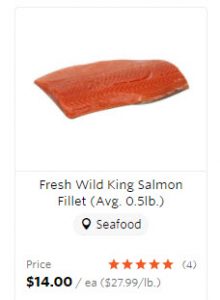
Finally on the subject of prices; not all the retailers are taking Atlantic Sapphire’s recommendation of a retail price as $14.99/lb. New Seasons Markets have put the price at $15.99/lb but are initially offering the fish at a promotional price of $13.99/lb; a saving of $2/lb.
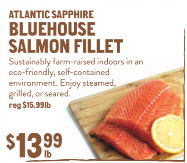
This is to attract shoppers to the salmon because the majority are unlikely to pay a higher price to buy fish from what is described as a eco-friendly self-contained indoor farm, especially as such descriptions are unlikely to appear at the point of sale. Certainly, when Wholefoods started to sell Atlantic Sapphire salmon there was no accompanying explanation.
Atlantic Sapphire’s farm may be described as eco-friendly but one aspect of closed containment which is never mentioned is welfare. Critics of net pen farming complain about salmon being crammed in together at 10-15kg/m3 yet whilst demanding a change to closed containment appear to ignore that stocking might have to reach 100/kg/m3 or more in order to be commercially viable. It would be interesting to know what stocking density Atlantic Sapphire will be aiming for at maximum production.
The reality is that closed containment is mainly advocated by those who blame salmon farming for declines of wild salmon or else are NIMBYs who want farms anywhere else but near them. Certainly, I have never heard one critic welcome a proposal to site a land-based unit near to the location of a net pen farm it would replace.
I began this commentary with reference to the belief by Corin Smith that land based closed containment has been proved to be commercially viable, He adds that ‘Non salmon farming nations like France, Spain, Dubai, South Africa and Japan have all seen billions of dollars of inward investment in land based salmon farming facilities.’ So why isn’t Scotland? The answer is that companies who already farm salmon might know something that all these investors don’t. I am reminded of Tulip Mania and the South Sea Bubble.
Tulip Mania occurred in the 1630s and was the first speculative bubble in history. Tulips were introduced to Holland around 1590 and soon became a coveted luxury item. The more unusual varieties were especially sought after, and people were willing to pay inflated prices to buy them. This led to a futures market with prices skyrocketing but by 1637, the promised bulbs failed to materialise, and the market collapsed with people losing vast amounts of money through failed contracts or bulbs with no value.
The South Sea Bubble occurred after investors were encouraged to buy into the South Sea Company in England in the early 1700s. Unfortunately, the promises of wealth came to nothing and investors lost fortunes. Could land based farming be just another such investment bubble?
My belief is that the closed containment farm is still to be proven. It will be interesting to see whether the rewards for investing in such farms actually materialise and whether land-based farming lives up to the claimed promises.
Finally, Mr Smith says that in ten years- time, no-one will want to buy Scottish salmon raised in their own sewage; that has destroyed wild fisheries and has polluted the seas, so what then for the Scottish net pen industry? The answer is that just as now, consumers are not interested in the views of a few industry critics, especially anglers like Mr Smith who readily kill wild salmon for sport. Equally, in ten years’ time, we are likely to be still waiting for proof that closed contained land based farms are the commercially viable.
Three Rivers: BBC News report that six salmon, allegedly from the storm damaged Carradale farm have been caught in three rivers in England. These fish were caught in the rivers Ehen, the Border Esk and the Cumbrian Derwent.
The BBC say that there has been a massive change in the ecological balance of the marine eco-system and that the full impacts are only just starting to play out. They continue that the freed fish have more than trebled the number of salmon in the seas around the west coast, all competing for the same food as a wild species already experiencing significant declines.
The BBC report appears overly dramatic, given that just six fish have been caught and as yet, the origins have not been confirmed. It is unlikely that there has been a massive change in the ecological balance of the marine environment because past incidents suggest that the majority of the fish will disappear out to sea and die and that it is just a handful that find their way into freshwater. The fact that wild salmon typically migrate to feeding grounds off Norway and Iceland means that they are not competing for food with wild salmon off the coast of south west Scotland. This is just misinformation spread to try to undermine the salmon farming industry. Wild salmon are experiencing significant declines but this has nothing to do with salmon farming since the declines are across the whole of the Atlantic salmon’s range.
The BBC spoke to Brian Shields from the Environment Agency who said that ‘we want to see as many wild fish spawning as possible to benefit future fish generations, which is why we want to make sure these farmed fish can be removed from our rivers to prevent future damage to the wild stocks’
However, if the Environment Agency is so concerned about making sure that every returning fish is given the opportunity to breed to benefit future generations and to prevent future damage to the wild stock, then why does the agency permit anglers to kill the wild fish for sport before they are able to breed.
In 2019, the last year for which data is available, anglers killed 67 wild salmon and 122 wild sea trout in just these three rivers. I suspect that the loss of these fish will have a much greater impact on the future of wild stocks in these rivers than the appearance of six fish, that are simply present in the rivers and are not even certain to breed.
The angling sector are quick to use any excuse to point the finger at salmon farming but have yet to accept any responsibility that their own actions may have an impact on the state of stocks of wild fish.
The Truth: Salmon farming industry critics are always demanding the salmon industry should tell the truth yet the reality is that when they are told the truth they refuse to believe it because it doesn’t fit in with their narrative. This can be illustrated with reference to one of the few critics on Twitter who seems to use his own name – Niall McKillop from Fort William, Mr McKillop repeatedly keeps tweeting that I am the author of tweets under the name of @TalkSalmon. Like other critics, Mr McKillop cannot believe that there can be more than one or two people willing to speak out on behalf of the salmon farming industry so any Tweets must be from either me or Hamish McDonell of the SSPO. I personally don’t think that they are from Mr McDonell, as he like me, does not need to hide behind any anonymous account. I am happy to say what I say under my own name. I have written to Mr McKillop more than once to say this is not me but he continues to use my name in association with his replies to that account. He is totally uninterested in anything except his own voice.
Yet interestingly, Mr McKillop did have the opportunity to correct my alleged misinformation to my face. Through Direct Messaging, I arranged to meet Mr McKillop at a café in Fort William. Unfortunately, he failed to turn up. I did message him to ask where he was and eventually, he claimed his car had broken down on the road to Inverness. He made no attempt to tell me as much. Instead, at the time we were supposed to meet, he seemed to be posting pictures on Twitter of butterflies on a Buddleia bush in his neighbour’s garden.
Like all these keyboard warriors, Mr McKillop is happy to criticise the salmon farming industry from behind his computer screen but is totally unwilling to debate the issues face to face. He is clearly not interested in the truth.

